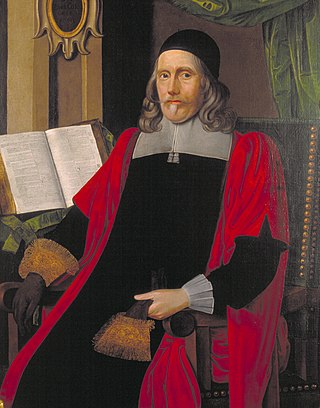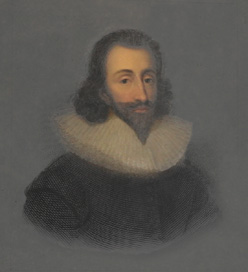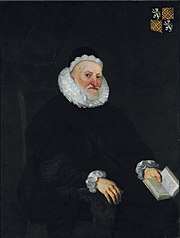Habeas corpus is a recourse in law by which a report can be made to a court in the events of unlawful detention or imprisonment, requesting that the court order the person's custodian to bring the prisoner to court, to determine whether their detention is lawful.

Sir Matthew Hale was an influential English barrister, judge and jurist most noted for his treatise Historia Placitorum Coronæ, or The History of the Pleas of the Crown.

Sir Edward Coke was an English barrister, judge, and politician. He is often considered the greatest jurist of the Elizabethan and Jacobean eras.

The Petition of Right, passed on 7 June 1628, is an English constitutional document setting out specific individual protections against the state, reportedly of equal value to Magna Carta and the Bill of Rights 1689. It was part of a wider conflict between Parliament and the Stuart monarchy that led to the 1639 to 1653 Wars of the Three Kingdoms, ultimately resolved in the 1688–89 Glorious Revolution.

The Habeas Corpus Act 1679 is an Act of Parliament in England during the reign of King Charles II. It was passed by what became known as the Habeas Corpus Parliament to define and strengthen the ancient prerogative writ of habeas corpus, which required a court to examine the lawfulness of a prisoner's detention and thus prevent unlawful or arbitrary imprisonment.

Sir Nicholas Hyde was Lord Chief Justice of England.

Sir Robert Heath was an English judge and politician who sat in the House of Commons from 1621 to 1625.

Bushel’s Case (1670) 124 E.R. 1006, also spelled Bushell's Case, is a famous English decision on the role of juries. It established beyond question the independence of the jury. It also confirmed that the Court of Common Pleas could issue a writ of habeas corpus in ordinary criminal cases.
In United States law, habeas corpus is a recourse challenging the reasons or conditions of a person's confinement under color of law. A petition for habeas corpus is filed with a court that has jurisdiction over the custodian, and if granted, a writ is issued directing the custodian to bring the confined person before the court for examination into those reasons or conditions. The Suspension Clause of the United States Constitution specifically included the English common law procedure in Article One, Section 9, clause 2, which demands that "The privilege of the writ of habeas corpus shall not be suspended, unless when in cases of rebellion or invasion the public safety may require it."
In United States law, habeas corpus is a recourse challenging the reasons or conditions of a person's detention under color of law. The Guantanamo Bay detention camp is a United States military prison located within Guantanamo Bay Naval Base. A persistent standard of indefinite detention without trial and incidents of torture led the operations of the Guantanamo Bay detention camp to be challenged internationally as an affront to international human rights, and challenged domestically as a violation of the Due Process Clause of the Fifth and Fourteenth amendments of the United States Constitution, including the right of petition for habeas corpus. On 19 February 2002, Guantanamo detainees petitioned in federal court for a writ of habeas corpus to review the legality of their detention.

Roger Maynwaring, variously spelt Mainwaring or Manwaring, was a bishop in the Church of England, censured by Parliament in 1628 for sermons seen as undermining the law and constitution.
Sir Thomas Darnell, 1st Baronet was an English landowner, at the centre of a celebrated state legal case in the reign of Charles I of England, often known as the 'Five Knights' Case' but to the lawyers of the period Darnell's Case.

William Coryton (1580–1651) of West Newton Ferrers, St Mellion, Cornwall, was a Cornish gentleman who served as MP for Cornwall in 1624, 1626 and 1628, for Liskeard in 1625, for Grampound in 1640 and for Launceston 1640–41. He was expelled from Parliament for falsifying returns.
Benjamin Valentine, was an English politician and Member of Parliament.
The Habeas Corpus Act of 1867 is an act of Congress that significantly expanded the jurisdiction of federal courts to issue writs of habeas corpus. Passed February 5, 1867, the Act amended the Judiciary Act of 1789 to grant the courts the power to issue writs of habeas corpus "in all cases where any person may be restrained of their liberty in violation of the constitution, or any treaty or law of the United States." Prior to the Act's passage, prisoners in the custody of one of the states who wished to challenge the legality of their detention could petition for a writ of habeas corpus only in state courts; the federal court system was barred from issuing writs of habeas corpus in their cases. The Act also permitted the court "to go beyond the return" and question the truth of the jailer's stated justification for detaining the petitioning prisoner, whereas prior to the Act courts were technically bound to accept the jailer's word that the prisoner was actually being held for the reason stated. The Act largely restored habeas corpus following its 1863 suspension by Congress, ensuring that anyone arrested after its passage could challenge their detention in the federal courts, but denied habeas relief to anyone who was already in military custody for any military offense or for having aided the Confederacy.

Sir John Eliot was an English statesman who was serially imprisoned in the Tower of London, where he eventually died, by King Charles I for advocating the rights and privileges of Parliament.
Sir Henry Calthorpe (1586–1637), was an English lawyer who acted as solicitor-general to Queen Henrietta Maria, and also as the defence barrister in two high-profile cases: the Darnell's Case and the Valentine case. He was Recorder of London in 1635–36, attorney of court of wards in 1636, and was knighted the same year.

The 3rd Parliament of King Charles I was summoned by King Charles I of England on 31 January 1628 and first assembled on 17 March 1628. The elected Speaker of the House of Commons was Sir John Finch, the Member of Parliament for Canterbury.
Stone v. Powell, 428 U.S. 465 (1976), was decision of the Supreme Court of the United States that limited which claims of Fourth Amendment violations could be made by state prisoners in habeas corpus petitions in federal courts. Specifically, a claim that the exclusionary rule had been broken would be barred if state courts had already given it a full and fair hearing. The decision combined two cases that were argued before the Supreme Court on the same day with similar issues, one filed by Lloyd Powell and the other, titled Wolff v. Rice, filed by David Rice.
Sir Edmund Hampden was an English landowner, at the centre of a celebrated state legal case in the reign of Charles I of England, known as the Five Knights' Case or Darnell's Case.










